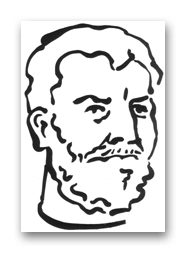|
|
  
Am I going too fast? Okay, I'll stop. But you can guess where I'm running with this. Karavis's existence hassles many of the tenets we put our faith in as readers, and the major tenet this Greek poet has complicated in all sorts of delightful ways is the authenticity of authorship. The vast documentary apparatus -- essays, letters, endnotes, diary entries, a blurry photo -- that Solway has erected to reinforce the taste and texture of Karavis's poems is so effective that even after their putative author has been "outed" we are still forced to choose the better book: Karavis's Saracen Island or Solway's Saracen Island? To be sure, Solway's voice has always been plural in its identity (each book throws over a previously achieved idiom for a new, untried cadence) and one could say that he is, yet again, dwelling inside another language-skin. I wonder, though, if Karavis may not have outmischiefed the mischief-maker.
Here are some lines from Solway's "Pawns and Pieces":
An advantage based on pawn position
is a thing of relative permanence;
such are the infinitesimal, million,
petty contacts in parlors and kitchens,
daily arguments buth without offense,
that consolidate the loved relation;
|
|

|
 |
|
And here's a specimen from Karavis's "On Seriphos":
In the workaday light
the sun, like a blacksmith,
leaves its hammer print
on the cliffside,
and at night
when all is cool and placid
stars are flashing like knitting needles
busy at their constellations.
|
Sonically these two examples could not be further apart. Solway's utterance is dense, intellect-driven and a tad imperious. Karavis's is spare, detail-nubbled and persuasive. In fact, reading the two poets back to back -- and god help me for saying this -- I can't but think that Solway's approach would embarrass Karavis. Indeed, the term "hoax" does no justice to the stunning conjectural scope of this project: to present poems that imagine another life in the most compelling way possible. Thus to declare karavis a skillfully constructed persona accessorised with ideas and feelings foreign to Solway is to misrepresent Karavis's allure (would anyone describe Flaubert's Emma Bovery with such soul-destroying literalness?). Karavis's convincingness, and the power of his poems, turns on literature's most important axiom: the most truthful reality can be attained by creating the most real character one can imagine. If Karavis didn't exist, he now does.
"As I work," wrote Solway during his first attempts at transcribing Karavis's poems, "I have the uncanny feeling that I am translating material which I myself have written in another time, another dimension, another life." Yet how does a literature devoted to the idolatry of self and culture -- i.e. what does your writing tell us about you and how does your writing represent us? -- come to terms with one poet's wish to retreat from its "epidemic of banality" (Antonio Tabucchi's phrase) and escape into, and speak out of, something richer? Can we still call these poems "Canadian" when their tactical supports are so completely borrowed from another culture? In an early essay called "The Flight From Canada" Solway asserts that "our poets are most truly Canadian when they . . . seek tributaries from elsewhere to swell the national brook." And if Solway is right -- if the flight from Canada is an act of fidelity -- then Andreas Karavis could well be one of our greatest Canadian poets.
|
|